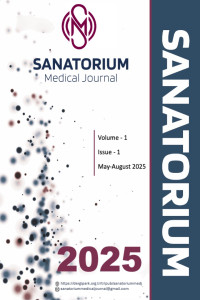Abstract
Introduction
Refeeding syndrome is a serious clinical condition that occurs when nutrition is reintroduced after a period of prolonged malnutrition. It can lead to edema and heart failure due to sodium and water retention, as well as hypokalemia, hypophosphatemia, hypomagnesemia, thiamine deficiency, and even fatal outcomes.
Case Presentation
A 58-year-old male patient was admitted to the ICU with soft tissue infection in the left foot and septic shock. Due to hypoglycemia, a dextrose infusion was initiated. On the second day, the patient developed hypophosphatemia, hypokalemia, and hypomagnesemia. Given his low body mass index (BMI) and history of prolonged malnutrition, refeeding syndrome was diagnosed. Phosphorus, potassium, magnesium, and thiamine replacement were administered. Since the patient refused enteral feeding, low-dose parenteral nutrition was initiated. Due to a decrease in platelet count, a peripheral blood smear was performed, and a hematology consultation was requested. Hematology specialists suggested that the thrombocytopenia might be related to the patient's clinical condition.
Discussion
Hypophosphatemia is classified as mild, moderate, or severe, based on serum phosphate levels. Oral phosphorus replacement is recommended for mild and moderate hypophosphatemia, whereas intravenous replacement is preferred in symptomatic or severe cases. In our case, oral phosphorus replacement was initiated when the phosphate level dropped to 1.3 mg/dL. Despite the development of diarrhea, intravenous therapy could not be administered due to the unavailability of intravenous phosphorus formulations in Turkey.
There are limited studies in the literature discussing the relationship between thrombocytopenia and hypophosphatemia. In a study by Yawata et al., conducted on dogs, hypophosphatemia was found to be associated with thrombocytopenia. Additionally, in 2015, a 16-year-old patient with diabetic ketoacidosis was reported to have severe hypophosphatemia-related thrombocytopenia. In our case, due to the coexistence of refeeding syndrome and septic shock, the exact etiology of thrombocytopenia could not be determined.
Conclusion
Since malnutrition is highly prevalent in ICU patients, refeeding syndrome remains a significant risk factor. Early recognition and appropriate management of the syndrome are crucial in preventing serious complications.
Key words
Refeeding syndrome, hypophosphatemia, phosphate replacement, thrombocytopenia, electrolyte imbalance
Keywords
Refeeding syndrome hypophosphatemia phosphate replacement thrombocytopenia electrolyte imbalance
Ethical Statement
Informed consent was obtained from the patient for the case to be presented and published.
Supporting Institution
Ankara Atatürk Sanatoryum Eğitim ve Araştırma Hastanesi
References
- 1. Stanga Z, Brunner A, Leuenberger M, Grimble R, Shenkin A, Allison S, et al. Nutrition in clinical practice—the refeeding syndrome: illustrative cases and guidelines for prevention and treatment. European journal of clinical nutrition. 2008;62(6):687-94.
- 2. da Silva JS, Seres DS, Sabino K, Adams SC, Berdahl GJ, Citty SW, et al. ASPEN consensus recommendations for refeeding syndrome. Nutrition in Clinical Practice. 2020;35(2):178-95.
- 3. Ponzo V, Pellegrini M, Cioffi I, Scaglione L, Bo S. The Refeeding Syndrome: a neglected but potentially serious condition for inpatients. A narrative review. Internal and emergency medicine. 2021;16:49-60.
- 4. National Collaborating Centre for Acute Care (UK). Nutrition Support for Adults: Oral Nutrition Support, Enteral Tube Feeding and Parenteral Nutrition. London: National Collaborating Centre for Acute Care (UK); 2006 Feb.
- 5. Krutkyte G, Wenk L, Odermatt J, Schuetz P, Stanga Z, Friedli N. Refeeding syndrome: a critical reality in patients with chronic disease. Nutrients. 2022;14 (14):2859.
- 6. Felsenfeld AJ, Levine BS. Approach to treatment of hypophosphatemia. American journal of kidney diseases. 2012;60(4):655-61.
- 7. Geerse DA, Bindels AJ, Kuiper MA, Roos AN, Spronk PE, Schultz MJ. Treatment of hypophosphatemia in the intensive care unit: a review. Critical Care. 2010;14:1-8.
- 8. Crook M, Hally V, Panteli J. The importance of the refeeding syndrome. Nutrition. 2001;17(7-8):632-7.
- 9. Knochel JP. The pathophysiology and clinical characteristics of severe hypophosphatemia. Archives of internal medicine. 1977;137(2):203-20.
- 10. Ganapathy VP, Palaniswamy VA, Vinod P, Narayanan L, Sahoo T, Das RR. Severe symptomatic hypophosphatemia with thrombocytopenia in a child with diabetic ketoacidosis. Journal of Comprehensive Pediatrics. 2015;6(4).
Details
| Primary Language | English |
|---|---|
| Subjects | Intensive Care |
| Journal Section | Case Report/Case Series |
| Authors | |
| Early Pub Date | April 28, 2025 |
| Publication Date | May 1, 2025 |
| Submission Date | March 17, 2025 |
| Acceptance Date | March 28, 2025 |
| Published in Issue | Year 2025 Volume: 1 Issue: 1 |
Sanatorium Medical Journal is a peer-reviewed, open-access journal dedicated to medical research.
Sanatorium Medical Journal by Atatürk Sanatoryum Training and Research Hospital is licensed under CC BY-NC-SA 4.0


